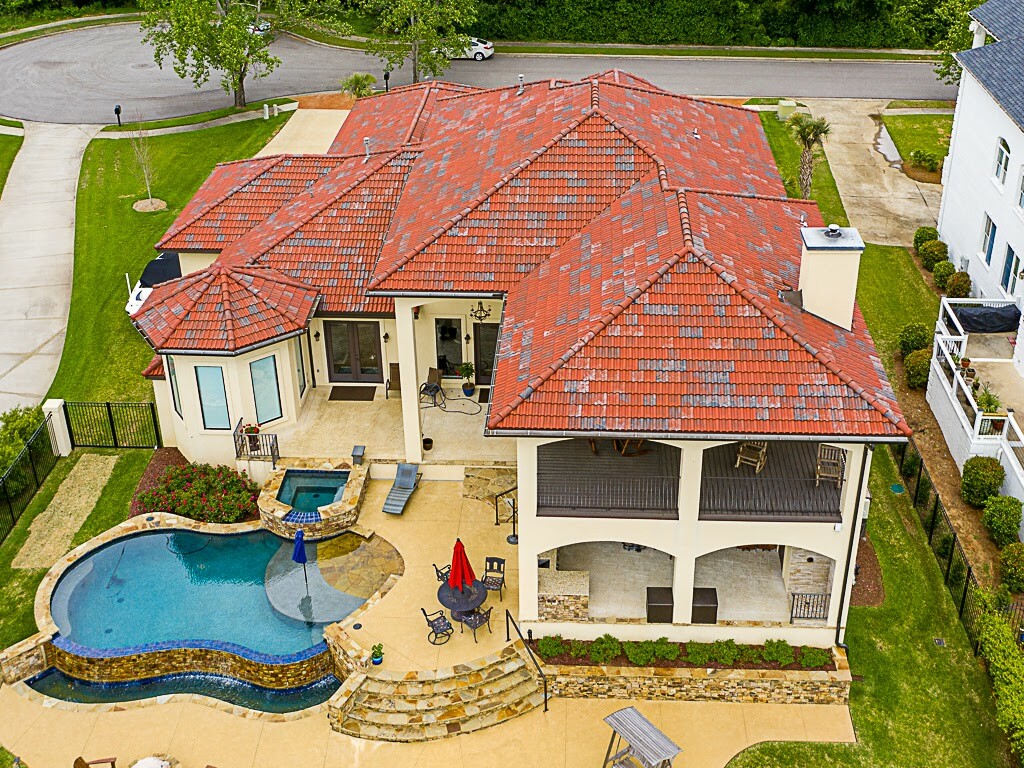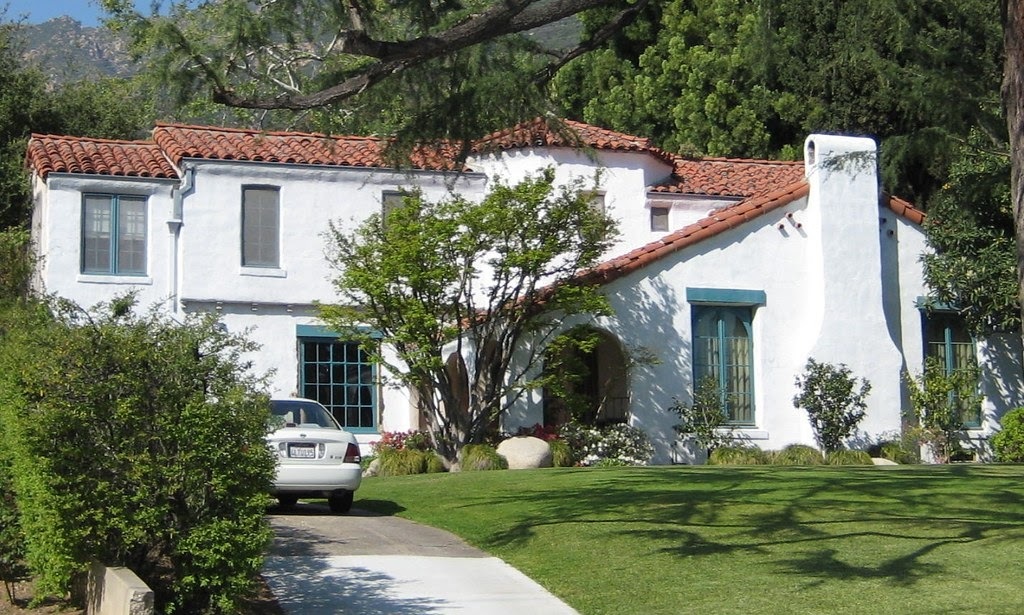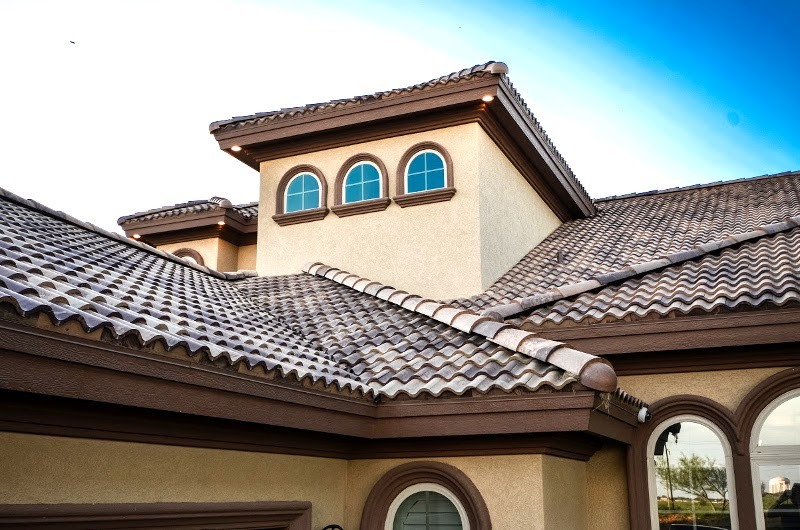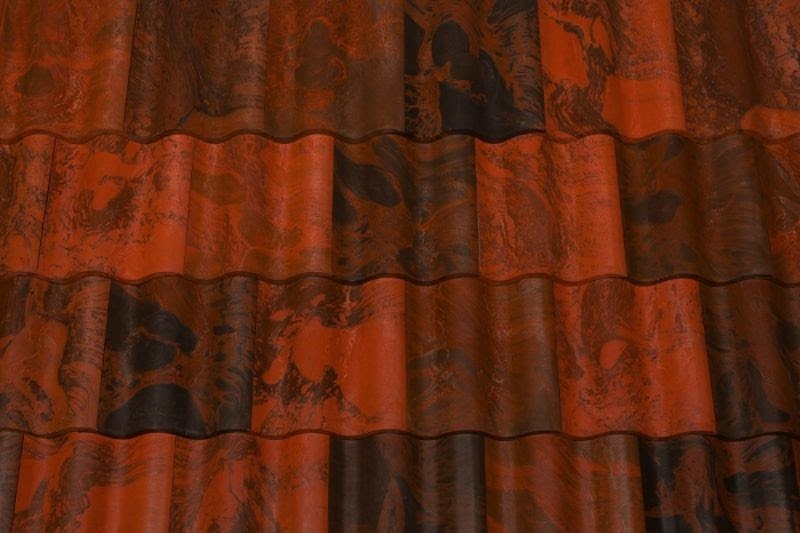Like most places, Southern California is home to many architectural styles, though some are more prominent than others. Of all the styles you can find, those that lean more Mediterranean are the most prominent, brought to the area by the Spanish.
Architectural styles like Mediterranean, Spanish Colonial, Mission Revival, and Tuscan vary in many ways, but they all have one thing in common: clay roofing tiles, also called Spanish Roof Tiles or Spanish Barrel Tiles.
Want to learn more about the Spanish roof tiles Los Angeles is known for, including some other excellent alternatives? Keep reading!
Origins Of Spanish Roof Tiles

Clay roofing tiles have roots that date back to ancient times in the Middle East and along the Mediterranean and were introduced by the Moors, who occupied Spain between the 8th and 15th centuries. By the 17th and 18th centuries, the popularity of these tiles had spread to other parts of Europe and were used for homes, churches, and public buildings.
As Europeans immigrated to the U.S., clay tiles were one of the many things they brought. The Dutch brought the tiles to the Northeast in the mid-1650s, while Spanish missionaries brought them to California in the early 1700s.
Although they fell out of style for some time before seeing a resurgence in popularity in the early 20th century, Spanish Barrel Tiles are becoming a popular roofing material in California and Florida.
Los Angeles Home Trends And Styles
You can find the Spanish influence that has been prevalent for centuries living directly beside twentieth century practicality. This eclectic blend has come to be defined as the “American style.” There are four styles that have remained popular in L.A. for at least 100 years:
Spanish Colonial
Mission Revival
Tuscan
Mediterranean Revival
Of course, there are many other home designs that are fashionable, but these four have one thing in common: Spanish Roof Tiles, or Spanish Barrel Tiles as they are sometimes called. Spanish roof tiles have been a part of Los Angeles residential architecture since the city was founded in 1781.
In fact, the history of clay roofing tiles goes back almost 5,000 years to the Greeks. However, they have been popular everywhere that clay is abundant, especially in regions that experience high temperatures, such as southern California. Clay roof tiles provide long life, exceptional weather protection, and they add a touch of European beauty to any home they grace. In Los Angeles, clay is a preferred roofing material because of its resistance to fire.
Mission Revival

Mission Revival home is one style that is known for using vibrant, red clay tiles. The style's notable features include plain stucco exteriors, arches, and mission-style parapets.
Spanish Colonial Revival

The Spanish Colonial Revival became the dominant style in Southern California in the early 1900s. The style blends elements from the Mission Revival, Mexican, Spanish Baroque, and Islamic styles. The result is a low-pitched roof with red clay tiles, courtyards, white stucco, and more. There are several variants, including Spanish-Moorish and Monterey Colonial Revival.
Mediterranean

Mediterranean-style homes came to California between the 1920s and 1930s, combining the ideas of Spanish Renaissance and Colonial, Italian Renaissance, Andalusian, and Beau-Arts styles. Their stucco exteriors are painted in bright, earthy colors, with flat tile roofs and decorative arches and shady terraces
Types Of Weather And The Effects On Roofing
When most people think of Los Angeles and Southern California, they think of bright, sunny weather that is almost always perfect.
However, this is not the reality; Southern California, like any place, has weather issues people need to be prepared for––and that their homes, especially their roof, needs to withstand. The types of weather you can expect in Los Angeles include:
Sun And UV Ray Exposure
There is no denying that the city experiences more sunny days than not, and while residents and visitors may thrive in the weather, roofs suffer. The constant exposure to the sun and its intense UV rays will degrade the roof over time. Asphalt shingles are particularly vulnerable, and can be brittle and prone to cracking. Clay roofing tiles are better able to withstand the heat and radiation from the sun to provide better solar reflectiveness, especially left unglazed.
Wildfires
California is highly susceptible to wildfires, which can ravage everything in their path, including your home. Even if your home is spared direct damage, smoke will settle on the surface, which can cause discoloration and other potential damage. Besides keeping your gutters clean, you'll need to rinse away any smoke residue. With clay roofing tiles, you can use a soft pressure wash with an appropriate cleaning agent.
Strong Winds
Southern California can get powerful winds, called the Santa Ana winds, during certain times of the year. The hot, dry winds can reach hurricane-level speeds and destroy an old or poorly maintained roof. Clay roofing tiles offer greater wind resistance than other materials and are able to withstand winds up to 125 miles per hour.
California Roofing Requirement Considerations
California has strict environmental and building code regulations––some of the strictest in the nation. Homes and buildings in the state need to withstand various weather conditions: wildfires, earthquakes, harsh winds, extreme heat, and more. Roofing requirements to consider include:
Title 24
Title 24 requirements require residents to meet certain energy efficiency standards. The Title covers many areas, including roofing. It requires residents to install "cool roofs" on their properties. Los Angeles homes need cool roofs with an SRI value of 20 or greater to be considered acceptable.
Fire Resistance
With the prevalence of wildfires in California, any roofing material you consider needs to have a Class A fire rating, the highest rating a material can have.
Impact And Wind Resistance
With the potential for strong winds, you want to ensure that your roof is safe from the impact of falling tree limbs and other debris. Consider options with a Class 4 impact rating, the highest rating possible. You also want to ensure the material can withstand hurricane-force winds.
Comparing DifferentTypes Of Spanish Barrel Tiles

Spanish tiles are an excellent option for homes in Los Angeles and they meet the requirements set out by both the city and state. However, new technology has made it possible to have a barrel tile roof without having to go with clay tiles. Besides the traditional option of clay, they can be made of metal, clay, or synthetic materials. Here are the pros and cons of the three options for Spanish roof tiles that Los Angeles residents can choose between:
Clay
Traditional clay roofing tiles are seen throughout Europe, California, and Florida. These tiles were typically handmade and hardened in wood-fired kilns to ensure that each tile was unique. Tiles are still handmade in some areas, while others have moved to more mechanical creation.
Advantages
Properly maintained clay tile roofs can last 100 years or more.
Clay tiles require minimal maintenance.
Clay tiles are extremely durable, wind, impact, and fire resistant.
Clay tiles provide a beautiful aesthetic you can't get with other materials.
Disadvantages
Clay tiles are heavy; homes may require additional engineering to support such weight.
These roofs are significantly more expensive and require an experienced installer, which adds to the cost.
Despite their durability, clay tiles are still fairly brittle and cannot be walked on like other roof materials.
While these roofs require minimal maintenance, they require a knowledgeable professional, which brings in additional costs.
Metal Barrel Tiles

Despite what many people may think, metal roofs can take many shapes, including Spanish barrel tiles. It has become a popular option because it is easy to manufacture.
Advantages
Metal barrel tiles are available in various colors.
Metal is a lightweight material that makes installation easier and more affordable.
Easy to install; any roofer with metal roofing experience can install it.
Can provide the traditional barrel tile look.
Performs well in most weather conditions.
Virtually maintenance-free.
Disadvantages
Metal roofing is still relatively expensive.
It can be noisy when it is rainy or windy, which can annoy some.
Metal expands and contracts with temperature changes.
While it doesn't break easily, it will dent.
Synthetic Spanish Barrel Tiles
The last option for Spanish barrel tiles that Los Angeles residents have is synthetic, also called composite barrel tiles. These tiles have been around for many years, and have improved in quality over time.
They are made from recycled materials which makes them more sustainable than other options. Composite barrel tiles offer superior durability and are more cost-effective. One brand of composite barrel tiles comes from Brava.
The Brava Difference

Brava's composite Spanish Barrel Tiles are an excellent alternative to traditional clay or metal barrel tiles. Brava tiles offer numerous benefits, including:
Class A fire rating, the highest rating possible in the industry for fire safety
Class 4 impact rating for the highest protection from hail and debris
50-year limited lifetime warranty
Able to withstand heat without excess contraction and expansion
Lightweight material that doesn't require additional structural support
Virtually maintenance-free
Made from 100% recycled material and can be recycled again to help reduce the amount of waste in landfills
Brava offers two "Cool Roof" color options that comply with California's Title 24 requirements, which apply to the whole state. There is also a white barrel tile with a Class C fire rating, which is a great option for non-residential applications.
Brava Roof Tile’s Spanish Barrel Tile Checks All The Boxes

Our synthetic Spanish Barrel tile is a notable sight throughout California, especially in Los Angeles, which is all about aesthetics and glamor. While clay may be the traditional material for these tiles, it's not the only option available, nor is it necessarily the best one. Brava offers an alternative with numerous benefits, from being lightweight and more durable to being more cost-effective, without losing the beauty of a classic barrel tile.
We are ready to help with your next roofing project by shipping you samples from our line of Synthetic Cedar Shakes, Old World Slate, and Spanish Barrel Tiles, free of charge.
Contact Brava today to learn more about our Spanish Barrel Tiles and get advice from our experienced professionals!



